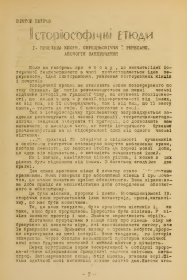Historiosophical Essays. In MUR [Mystetskyi Ukraiinskyi Ruh], Vol. II, 1946, pp. 7-18; MUR [Mystetskyi Ukraiinskyi Ruh], Collection III, 1947, pp. 7-10.
Keywords:
philosophy of history, philosophy of art, postwar history, philosophy of Ukrainian emigrationSynopsis
Viktor Petrov's article is a central and, to a certain extent, programmatic text for the author's historiosophical concept (in modern language, the concept of ‘historiosophy’ can be understood as the philosophy of history). The text consists of three parts: 1) The Problem of the Epoch, the Middle Ages and the Renaissance. The Apology of Negation; 2) Art of the Nineteenth and Twentieth Centuries. Methodological Foundations of the Study of the Epoch; 3) The Problem of Gottfried Keller.
The author's key task is to define the role of negation as a ‘structural norm in the construction of ideologies’ (p. 180). In his opinion, the function of negation in history is one of the leading problems of historiosophy, which is especially pronounced in the process of changing epochs: ‘...when two epochs change, the worldview of the new epoch is created not by itself and not from itself within a given era, but in the struggle against the worldview of the previous one’ (p. 184). The chronological matrix that Petrov focuses on is the consequent change of three epochs: The Middle Ages, the Renaissance, and the contemporary time (which he calls ‘Our Time’), each of which, as the author shows, emerged against the background of the negation of the dominant worldview of the previous one (the irrational world of the superhuman and supernatural inherent in the Middle Ages was replaced by the modern idea of the rational and natural world, which was eventually replaced by the technical and material world created by machines). According to Petrov, the most successful epistemic guideline is the one aimed at entire cognition, devoid of ‘pluralistic fragmentation’ (p. 193). It is expressed by the concept of the epoch introduced in the ‘historiosophy’ of the first half of the twentieth century, which encompasses the entire temporal and spatial scope of our ideas and concepts and, ultimately, overcomes the particularism of the views on the historical process that dominated in the past.
The article is presented in two versions:
1) The original edition of MUR (1946-1947).
2) Reprinted in the publication ‘Ukraina Moderna’ (2008). The material also contains a commentary on the article by historian Andriy Portnov.
Vlada Davidenko
Downloads




